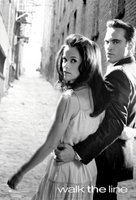Walk the Line
 This excellent biographical film of iconic country music singer Johnny Cash covers his life from his boyhood years on the family farm in Arkansas, to about 1970, when he made his famous live recording at Folsom Prison.
This excellent biographical film of iconic country music singer Johnny Cash covers his life from his boyhood years on the family farm in Arkansas, to about 1970, when he made his famous live recording at Folsom Prison.As his music so famously and soulfully indicates, Cash led a hard life growing up. His older brother--and his father's favorite--died while working at a saw mill to help provide for the struggling family. We are shown the young "J.R." with his face buried in his pillow, as Cash's father, in a fit of despair and rage, shouts at Cash's mother that "the Devil took the wrong boy." The next scene shows a grown-up Cash (now played by Jacquin Phoenix) as he leaves the farm for good, bound for two years of Air Force duty in Germany. As Cash walks down the long dirt road, it evokes the image of a man who is alone in more ways than one.
After his tour of duty, Cash returns, gets married on a whim, and starts a small-time Gospel trio. He makes his big break singing "Cry, Cry, Cry" to a skeptical record producer, and from then on, his rise to fame seems assured (at least as far as the movie is concerned). But although success came relatively early in his music career, it served only to exacerbate his old demons, while also creating news ones.
At one of his first concerts on tour, Cash literally runs into June Carter (played with a twinge of melancholy by the heretofore perennially perky Reese Witherspoon), and so begins an on-again, off-again love story that lasts for over a decade before June finally relents. June was a member of country music's most famous family, and she was painfully aware of the sacrifices one must make to live in the public eye. Cash was less concerned with keeping up appearances, creating an endless source of tension between the two performers.
The narrative follows the familiar pattern of all the biographical movies of celebrities you've ever seen: Initial poverty, stunning and rapid success, good times, infidelity, drug and alcohol addictions, a crumbling life, lots of drama and awkward moments (indeed, judging by Walk the Line, sometimes it seems as if Cash's entire life was just one awkward dinner scene after another), then--sometimes--redemption and recovery. For Cash, the redemption came in the late 1960s, when after wallowing in misery for years, he goes to church one Sunday with June. It is a brief but moving scene.
The performances are first-rate throughout. Most remarkably of all, Phoenix and Witherspoon did their own singing, mimicking Johnny and June Cash's distinctive voices so well that even devoted fans of Cash assumed they were hearing the Man in Black himself. Most of Cash's biggest hits are performed over the course of the movie, and on the drive home from the theater, you'll be singing them all.

0 Comments:
Post a Comment
Subscribe to Post Comments [Atom]
<< Home